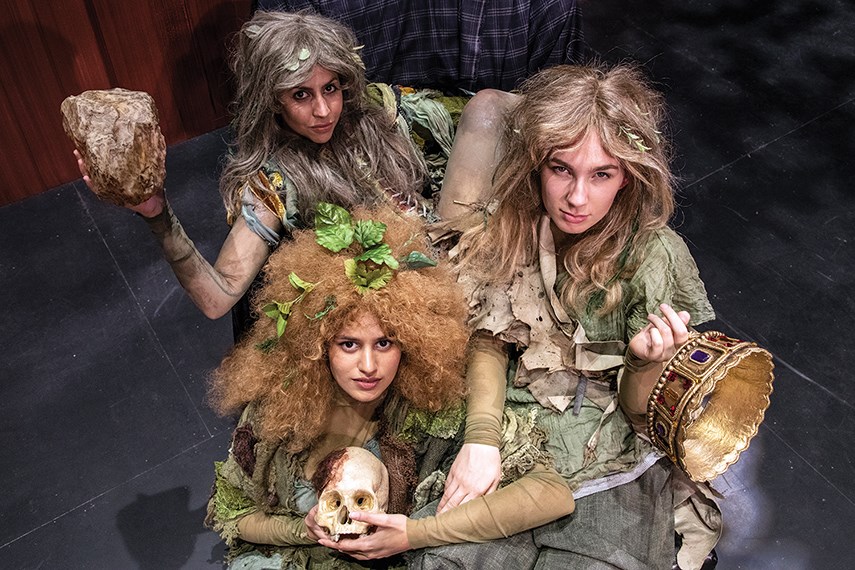Macbeth, CapU Theatre Series, The BlueShore at CapU - Birch Building, Nov. 14-23.
There’s the world of magic. There’s the theatre of the tragic. And at Capilano University’s Birch building, they’ll be one and the same.
For the first time, Macbeth will swap his sword for a wand and battle foes by conjuring spells, explains director Nicholas Harrison, as he awaits the play’s debut.
“I don’t think anyone’s done it this way,” he says.
Harrison, who previously brought pirates to Twelfth Night and punk rock to Moliere’s The Learned Ladies, was looking for something different to do with Macbeth.
He’d seen the Scottish play set in the First World War and he’d watched the Weird Sisters as nurses and as garbage collectors but what he really wanted for Macbeth was something his students would relate to.
It was around that time Harrison entertained the idea of injecting Harry Potteresque magic into Shakespeare.
There are commonalities between Macbeth and J.K. Rowling’s sorcery saga, he notes. Both stories contain a certain type of prophecy – those cryptic predictions that, at best, lead to attempted murder.
Macbeth, bewildered by the Weird Sisters and intoxicated by his own ambition, charts a bloody course for the crown. Voldemort follows a similar path to power, also based on a piece of a prophecy.
“There’s a lot of parallels between the Rowling stories and of course her inspiration, which was Macbeth,” Harrison explains.
The notion of a wizarding world in iambic pentameter resonated with the theatre students, many of whom were well-versed in “Potter-lore,” according to Harrison.
“When you give them a parallel like that, they start relating to it more and they get so much more invested into the language.”
For some students, having a familiar reference point helped them navigate Shakespeare’s world.
“It’s not just some ancient writer who they can’t make sense of. Now they’re finding something that they really enjoy,” he says.
Other changes to the play are less startling but equally intriguing for fans of Macbeth.
Harrison previously staged the play before where Macbeth was a sociopath who used prophecy as his own form of diplomatic immunity. This Macbeth is a tad more sympathetic, Harrison offers.
“For this particular one, I’d say the poor guy is a victim. But he’s also a murderer,” he adds. “Let’s not let him off too easy.”
And Lady Macbeth, the powerful, persuasive woman who seems to nudge the dagger into her husband’s hand, is a little stronger.
“I’ve done something completely different with this character,” he promises.
While Lady Macbeth generally disappears from the stage after her courage falls from its sticking place, Harrison has devised a way to keep her in the play.
There are a few other alterations, Harrison adds, noting that in this staging Macduff is a woman and Banquo is gender fluid.
All in all, he says it’s bold.
“Something they’re likely not going to see at Bard on the Beach,” he says with a laugh. “We have the freedom to take a few more risks than they do at a commercial theatre.”
But while the magic-filled production may sound like it takes liberties with the classic tragedy, Harrison explains that the story remains sacrosanct.
“I love the classics and I love finding a way to contemporize that will not alter the intention of the playwright,” he explains.
Asked if this Macbeth is funnier, Harrison is quick to issue a denial.
“It’s definitely not funnier,” he says. “There are comical moments . . . but it’s still a tragedy.”
And while the sights onstage may be unexpected, the sounds remain Shakespeare’s centuries-old poetry.
“I’m really hoping that the Millennials, and the Gen Ys and the Gen Zs are all more interested,” he says, speaking two days before the show’s premiere.
The cast is packed with third-year students who are about to graduate and become the future actors of Vancouver, Harrison says.
“I honestly think it’s comparable to anything you might find on the professional stage.”



